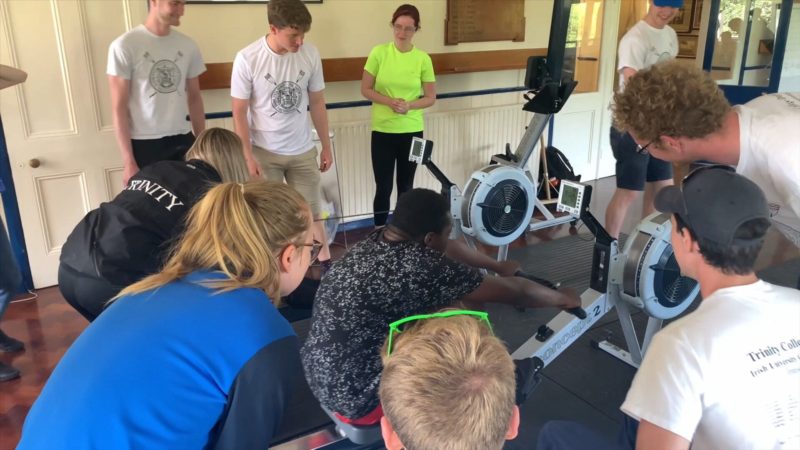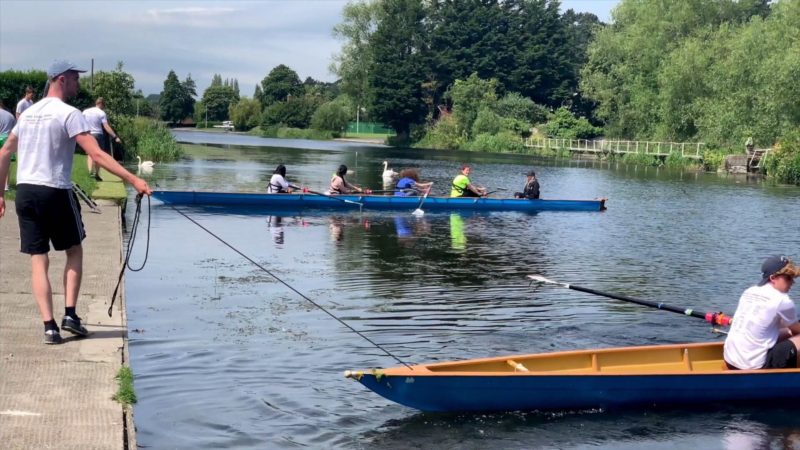Tucked away behind the Irish National War Memorial Park, Dublin University Boat Club’s (DUBC) clubhouse overlooks a serene part of the city. Sitting on the south bank of the Liffey, the club’s headquarters is a hive of activity during the summer months.
Unlike many of College’s sports clubs, this period is the busiest for the Boat Club (notably, the National Championships, the most important rowing event of the year, is held every July). Both Dublin University Ladies Boat Club (DULBC) and DUBC are always represented in strong numbers at the flagship event.
This summer, the Boat Club, with the help of Trinity Access Programme (TAP), recruited a new cohort of rowers. Over four weeks in June, over 40 young people from TAP’s partnered secondary schools took to the waters at Kilmainham for the first time as part of a joint initiative between the Boat Club, TAP and Trinity Sport.
The first initiative of its kind between TAP and a sports club in Trinity, the project saw the young students participate in week-long rowing summer schools. Current Trinity rowers acted as mentors to the students, showing them the basics of rowing, before organising races and an awards ceremony at the end of the week.
Ifunanya Chukwuewuzie was one of the secondary school students who participated in the programme and, she tells The University Times over email, it opened her eyes to the sport and the opportunities it offers. She says: “During the breaks, I would ask the Trinity students about their rowing journeys and their courses in Trinity among other things. I found it helpful to ask people who study at Trinity, their opinions on the college as they gave me a lot of advice for when I want to apply.”
Chukwuewuzie adds: “I would definitely consider it [rowing competitively] in the future.”
This ideal underpins the whole initiative, Sean Canning, the captain-elect of the Boat Club, tells The University Times in an email. He says that “DUBC’s mission has always been enjoying hard training and performing competitively. Everyone who chases that goal is welcome in DUBC, regardless of background”.
During the breaks, I would ask the Trinity students about their rowing journeys and their courses in Trinity
William Doyle, the captain of the Boat Club, tells The University Times that accessibility is a priority for the club. “I think that we’ve always been very accessible and inclusive”, he says. “I mean, rowing is not a big sport in Ireland. A lot of our guys wouldn’t have rowed before coming to college.”
Canning, along with Doyle, worked to bring the camp to fruition. Having previously worked with TAP during his own time in secondary school, Canning drew parallels between TAP’s mission statement and the Boat Club’s own ethos. Working with TAP made sense: “The hardworking, equality of opportunity approach that TAP encourages is mirrored in DUBC.”

Daniel McFarlane, the Schools and Community Outreach team member at TAP, says he was immediately happy to come on board when the Boat Club got in touch. He says the enthusiasm from the Boat Club turned an idea into a successful summer camp programme within six weeks: “Will [Doyle] and the rest of the team, they really did pull it out of the bag … they had such a strong team at the Boat Club.”
McFarlane says the camps, as well as offering students a taste of a sport they might not otherwise experience, allowed him and his colleagues to raise awareness about higher education and the various routes open to prospective students.
“Trinity Access provided ‘So you think you can College?’ talks each week about the various access routes to college”, he says. “One of us would go down and talk to the students about college life, progression at college, but they really got that off the rowers themselves, nearly every day just chatting with them.”
Will and the rest of the team, they really did pull it out of the bag … they had such a strong team at the Boat Club
Arguably, the greatest success of the scheme is the pioneering nature of the collaboration between a sports club and Trinity Access. Both Doyle and McFarlane highlight the significance of the initiative as the first of its kind. McFarlane admits that sports is an area of college life that somewhat fell to the wayside when it came to planning TAP events on- campus.
TAP, he says, has always excelled at attracting “top-of-the-class” students, those already predisposed to high academic performance, but diversifying through initiatives such as these opens pathways to a “different style of student”.
The sense I get from speaking with Canning, Doyle and McFarlane is that there was a genuine symbiosis between both TAP and the Boat Club throughout the running of the camps. The compatibility of respective aims allowed the programme to flourish. Undoubtedly a crucial facet of the college experience for many, the summer camps provide a microcosmic insight into Trinity’s sports scene and its community. Unlocking the potential of a wide group of prospective students through sport is at the core of the programme’s ethos. With plans to expand the programme next year, the Boat Club’s drive to expand the reach of rowing in Trinity and beyond shows no sign of slowing down.







